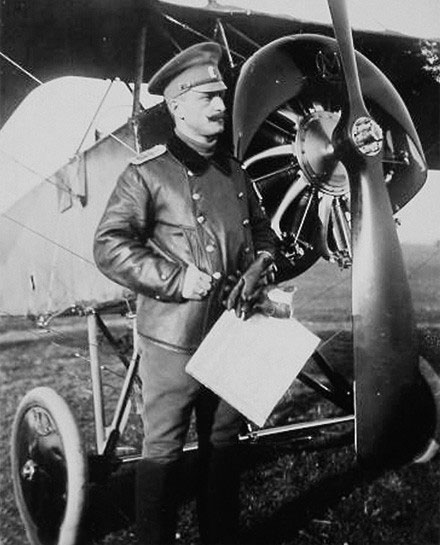
Early spring of 1965 in a basement on the outskirts of Krasnodar communal died a lonely old man, whose name was Vyacheslav Matveevich Tkachev. None of his neighbors did not know that once this man wore gold epaulettes and generals commanded the Air Force of Russia on the battlefields of the First World War, and later headed the aviation Russian army of General Wrangel ...
This man has put Russia's first world distance record flight. He was the first Russian military pilots during World War II, was awarded the Military Order of St. George. It became the first non-belonging to the royal family head of the field of aviation and aeronautics management of the army, actually - commander in chief.
He also became the first in the Russian army of General Aviation. And was the only one who rose to the rank of general of the highest provided in each of the types of domestic armed forces of the prerevolutionary period. But despite the many merits, the person's name for many years has been erased from the history of Russian military aviation, to which he devoted most of his life ...
COSSACKS T Kachev known in the Kuban from the middle of the XVIII century. Grandfather of our hero centurion Vasily Tkachev flashed prowess in 1829 when taking the Turkish fortress of Anapa and was awarded a personal nobility. The order of Lieutenant-General N. Zavodovsky the troops of the Caucasian line from November 20, 1852 referred to the Cossack Matvei Tkachev, distinguished himself in repelling the attack on the village party outlaws and House Guard Colonel Sigati Giray and produced for valor in the police officials. During the Crimean War, a dashing swordsman was the Knights of St. George, later promoted to troop sergeant (Lieutenant Colonel) and acquired hereditary nobility.
In this man's family settled in the village Kelermesskaya, September 24, 1885 and had a son Vyacheslav. He is five years old, planted in a Cossack saddle, to the general's stripes was then very far! ..
Received his primary education at home, a boy ten years old successfully passed the entrance exam to the Nizhny Novgorod Count Arakcheev Cadet Corps. During his studies, calm and reasonable kazachonok became close friends with a mischievous and reckless Pyotr Nesterov, by virtue of his irrepressible character spends more time in the brig than in the classroom. This friendship, bound in such a young age, the Cadets Nesterov and Tkachev carried through life.
After graduating cadet Vyacheslav entered the Konstantinovsky Artillery School, Peter - also in the artillery, but Mikhailovskoe. In 1906, both graduated, and in many ways their seven years parted. Lieutenant Nesterov went to Vladivostok, the 2nd battery 9th East Siberian Artillery Brigade, and the cornet Tkachev - in the Caucasus, on the border with Turkey, where he took a platoon of the 2nd battery 39th artbrigady 1st Caucasus Corps.
They met again in March 1913: the centurion Tkachev after Sevastopol Pilot School and Lieutenant Nesterov, who passed exams in Gatchina, were assigned to the newly formed cabinet XI Squadron, stationed in Kiev.
Nearly a year they flew together. But what it was a year! Two weeks prior to the day when the sky in Kiev Peter Nikolaevich was tied famous "dead loop", the centurion Tkachev, lieutenants Nesterov and limber for the first time in Russia made the trip link in tight formation, almost touching the wings of airplanes.
Time development of mass flight in the dense battle formations come for Russian military pilots only three years - at the beginning of 1916. In this kind of domestic aviation combat training will introduce the only remaining by the time the survivors of the first party of the group flight esaul Tkachev ...
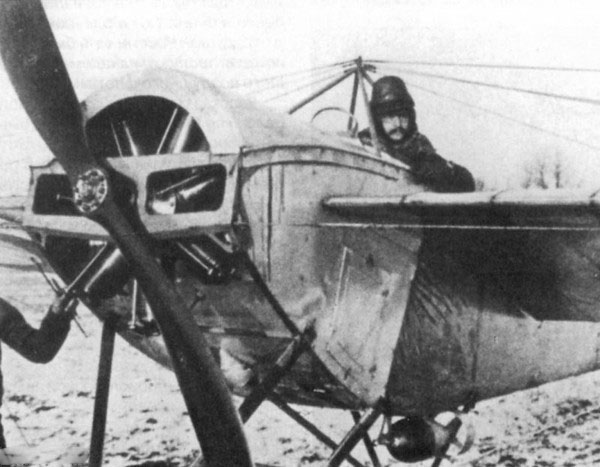
In October 1913, Vyacheslav Matveevich Aircraft "Nieuport" made brilliant in every way flight from Kiev-Odessa, Kerch-Taman-Ekaterinodar length of 1,500 miles, which took place, as was said in one of the telegrams, "in rainy autumn and without pre-course preparation. " These words reflect the essence of flights Tkachev.
fact that a little earlier in Russia conducted aviasostyazaniya route Petersburg-Moscow to St. Petersburg, which has half a dozen eminent Russian pilots unsuccessfully tried to pass in less than 18 hours. Without belittling the courage and professionalism of the pilots, pay attention to two things. Firstly, the track was well known to them and not just overfly.Second, ideally prepared in terms of ground-based navigation and technical support: Fly Me along the railroad tracks without wasting time searching for other targets ... So no wonder that flight Tkachev was recognized by the international achievement, and Kiev Society for Aeronautics aviator awarded the gold badge " For the most prominent in Russia in 1913, flight. "
fact that a little earlier in Russia conducted aviasostyazaniya route Petersburg-Moscow to St. Petersburg, which has half a dozen eminent Russian pilots unsuccessfully tried to pass in less than 18 hours. Without belittling the courage and professionalism of the pilots, pay attention to two things. Firstly, the track was well known to them and not just overfly.Second, ideally prepared in terms of ground-based navigation and technical support: Fly Me along the railroad tracks without wasting time searching for other targets ... So no wonder that flight Tkachev was recognized by the international achievement, and Kiev Society for Aeronautics aviator awarded the gold badge " For the most prominent in Russia in 1913, flight. "
New 1914 year has also brought changes: after the departure to increase the squadron commander XI took his post captain Peter Nesterov. A few days later received a new assignment and podesaul Vyacheslav Tkachev - he was ordered to form and then take command of the squadron XX.
Prior to the beginning of world war left some five months ...
Tkachev of pilots he established the 1st Squadron of the Kuban Cossack 1919
Tkachev Squadron arrived at his first front-line airport July 28, 1914 and went to the headquarters of the 4th Army, Southwestern Front, which he was obliged to provide daily fresh intelligence information. August 10 is the grandest battle began, which later historians call the battle of Galicia. It will blaze twenty days at the front length of 150 kilometers ...
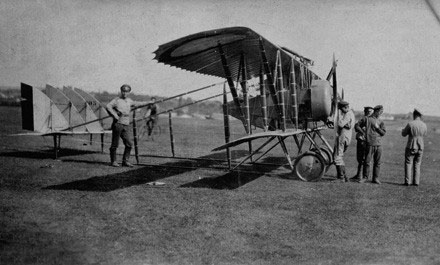
August 12 Vyacheslav Matveevich flew for exploration in the area of Sandomierz on his "Nieuport-4." Due to the fact that the search area was at maximum range, and for maximum ease of machine podesaul did not take a pilot observer. At a distance of twenty miles from the front lines with a height of eight meters pilot opened a grand panorama of almost two Austrian divisions thick columns sent to the front lines.
Approaching to Annopolyu commander squadron realized that they found the column - only part of the enemy's body, hurried march to nominate under Lublin, to the Russian right wing. Scout noticed and started firing at the ground. Despite the obvious danger, Tkachev walked several times over the roads, boarded the enemy. It was only after several bullets struck his wings of an airplane, he turned to his. At Hog Tkachev discovered another infantry brigade of the Austrians, artillery units.Now the collected information required as quickly as possible to bring in the army headquarters.
In the area of Krasnyk plane fired shrapnel, oil tank appeared knocked out of it poured thick jet engine could jam at any moment. Bent in an incredible position and throwing pedals Tkachev legs tucked oil fountain, a little while to extend the work of the motor - to the neutral area were only a few minutes of flight ...
Originality control "Nieuport-4" was the fact that the machine is achieved krenenie deviation pedals, not the knob, as on other airplanes. Therefore, when Tkachev put his feet up, to plug the hole in the oil tank, his airplane to the ground contact was without lateral control. In this situation, the chances of successful completion of the flight is almost zero. And the man who put the same car in such circumstances should be considered not just a very good pilot and pilot the grace of God!However, Tkachev and was gone.
... After landing at the location of the Russian infantry podesaul despite scalded with hot oil foot summon itself horse domchalsya it to the nearest field telephone and gave intelligence to the army headquarters. Then he managed to get a peasant cart, to return with her to the place of an emergency landing, disconnect using infantry wings from the body "Nieuport." And literally under the noses of the advancing Austrians evacuated wounded car!
Order of the Chief of the armies of the Southwestern Front number 290 of November 24, 1914 "military pilot podesaul Vyacheslav Tkachev for what penetrated to the rear of the enemy position and, despite enemy fire, damaging the life of the machine, with exceptional resourcefulness, presence of mind and selfless courage fulfilled its task in time to deliver extracted information of paramount importance than in the adoption of strategic decisions that led to the obsession decisive success over the enemy "was - the first among the Russian pilots! - Awarded the Order of St.. George 4-th degree.
December 14 Vyacheslav Matveye nominal telegram congratulated on the high award the Grand Duke Alexander Mikhailovich, patronage, at the behest of the royal family member over the Russian military aviation.
Later Tkachev continued to participate in combat operations, acting skill and dedication, as evidenced by the fighting reports:
"Between 4 and 7 June 1915, despite the obvious danger to life from the destructive fire of anti-aircraft batteries, VMTkachev repeatedly penetrated into the rear of the enemy, collecting important information. Met in the German airplane, armed machine gun, came with him to fight and put him to flight. July 4, producing aerial reconnaissance in the area of the rivers Lena and Styr, revealed a concentration of a strong shock of the German group "
During the First World War Tkachev distinguished himself as a brave pilot and skilled organizer and theoretician of combat employment of aircraft. The combination of these qualities, he became the commander of aviadiviziona, and in August 1916, already a lieutenant colonel, led the first Russian military Air Group (abbreviated - 1st BAG), which consisted of three fighter squadrons. The purpose of the group was a cover for ground troops from attacks by enemy aircraft, protection of their scouts and bombers from enemy aircraft, and most importantly - the destruction of the German-Austrian aircraft in the air.
Tkachev (standing second from left) among the participants of the Odessa Aviation School, led by the commander of the PSBs adjutant general NP Zarubaeva and president of Aeroclub AA Anatra, 1911
V.M.Tkachev spy in the cab "Moran-parasol," Russian-German front, winter 1914-1915 years
Esaul Tkachev airmen with the 20th Squadron of the body in a hangar near "Mora parasol"
A Tkachev continued to fight. And soon his name was again on everyone's lips - podesaul shot down an enemy plane, which at that time was an outstanding achievement.
The fact that at the time of entry into the war, none of the 236 Russian airplanes had not been adapted to fire destruction of enemy aircraft or ground targets. Aerial reconnaissance and delivery of reports - that's the only problem, which, according to the military leadership, were able to perform these imperfect and unreliable machines. However, the pilots themselves thought quite differently.
"If in 1914 - will write later in one of his books General Tkachev - we possessed airplanes mounted with machine guns, which, incidentally, suggested at one time to make Pyotr Nesterov, then surely could create a barrier to airborne enemy, the Germans and the nose would not be stuck on our territory. "
"If in 1914 - will write later in one of his books General Tkachev - we possessed airplanes mounted with machine guns, which, incidentally, suggested at one time to make Pyotr Nesterov, then surely could create a barrier to airborne enemy, the Germans and the nose would not be stuck on our territory. "
But weapons on the aircraft at the beginning of the war was not. And each of the pilots sought their own ways of air combat. Staff Captain Nesterov first in the world to apply air ram, "death remembering his feat." Podesaul Tkachev went the other way: in December 1914, he - again the first of the Russian pilots - knocked the German "Albatross" ... pistol shots!
second downed enemy aircraft commander XI Squadron chalked up in August 1916: Again the fire of personal weapons he managed to damage the engine two-seater airplane Austrian "Aviatica" machine sat near the Russian trenches and along with the crew was captured by the infantry.
second downed enemy aircraft commander XI Squadron chalked up in August 1916: Again the fire of personal weapons he managed to damage the engine two-seater airplane Austrian "Aviatica" machine sat near the Russian trenches and along with the crew was captured by the infantry.
Flight talent Tkachev was indeed multifaceted. A few times, he distinguished himself as a scout. July 4, 1915 it was he who opened the concentration of the shock of the German group in the area between Lina and Styr, and in the end of June 1916 as a result of an operation carried out on the basis of intelligence extracted Tkachev, Russian troops seized nearly 30,000 German prisoners of war. The pilot for what it was awarded the George weapon.
In August 1916, Vyacheslav Matveevich formed and led the first in the Russian army air force - 1st Fighter Air Group, which includes II, IV and XIX squadrons. Baptism of fire air group pilots received in September under Lutsk, over which sparked fierce air battle. On 13 September 7th Russian fighters led by Tkachev intercepted a group of eight German bombers who tried to break through to the city. A fight broke out. Having lost three cars, the Germans turned back, but our chased them and lost from barrage one fighter shot down three bombers.
"On the south-western front in the fall has been applied squadron Air Combat System, which gave excellent results - wrote in those days the magazine "Sparks." - No enemy aircraft could not penetrate the airspace over our troops in the area of Lutsk, and our pilots flew reconnaissance and bombing quite successfully. " And indeed it is. Suffice it to say that the ratio of downed German and Russian aircraft in the South-Western Front in August-December 1916 there were 4: 1.
"On the south-western front in the fall has been applied squadron Air Combat System, which gave excellent results - wrote in those days the magazine "Sparks." - No enemy aircraft could not penetrate the airspace over our troops in the area of Lutsk, and our pilots flew reconnaissance and bombing quite successfully. " And indeed it is. Suffice it to say that the ratio of downed German and Russian aircraft in the South-Western Front in August-December 1916 there were 4: 1.
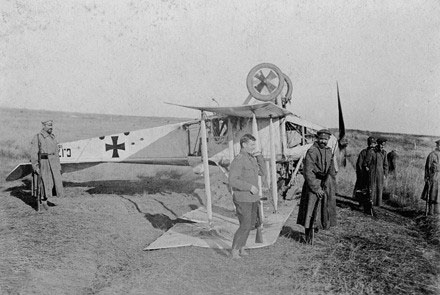
During the First World War, Vyacheslav Matveevich has established itself not only brave, skillful pilot, but a great commander-organizer and theoretician of the use of fighter aircraft: the fall of 1917 he published his book "The tactics of air combat" - the first scientific work in Russia on this subject.
The pinnacle of their careers V.M.Tkacheva for the years of World War became the Chief of the Field Management of Aviation and Aeronautics (PUAiV) adopted by them June 9, 1917. This name wore headquarters combat aircraft, which is subordinate to all air units, focusing on Russian-German front, from the Black Sea to the Baltic. PUAiV chief Vyacheslav Matveyevich was still a lieutenant colonel, but in August he was awarded the rank of colonel. Position Tkachev had yet another name - the chief of the army aviation, abbreviated - aviadarm.
In the period when Tkachev headed the Russian frontline aviation, marked its highest achievements. A few months Russian pilots shot down more enemy aircraft than three years of war pred¬shestvuyuschih. Undoubtedly, this is a considerable merit of their commander.
Like most officers, Tkachev hostility took the October revolution. And it is not surprising, given that the Bolshevik seizure of power led to a disintegration of the army, a catastrophic decline in discipline and a wave of defections. Cases of open insubordination and even soldiers' killings of his officers have become commonplace on the front.
It should be noted that aviation is much longer than other branches of troops managed to maintain viable. Even in November 1917, when the Marines massively throwing trenches and fled to the rear, pilots continued to fly on the job, and even shoot down enemy planes. However, rampant disorganization inevitably affected and air units. Tkachev was painful to see how the dying what he devoted all his energy, knowledge and experience.
The last straw that broke the patience of Colonel, was the arrival of his staff is absolutely not versed in aviation Krilenko Bolshevik commissar of the Baltic sailors who Tkachev had to pass their powers. Vyacheslav Matveevich submitted a letter of resignation from the post, left the Office of Air and went to the Kuban, leaving a note in which were these words:
"Capture Bids Bolsheviks put me in an impossible position. In front of me there was a problem: obey Krilenko and thus take part in the destruction of the state, which carry with them the power of the invaders, or put itself at the mercy of the victors, expressing them his insubordination. However, the solution to this issue by the first method could not take place, because, according to available data I have, I should have been arrested, even whether I will obey Krilenko impostor or not.(...) I pray to save for the future Russia at least a cell that will be the beginning. Breaking with his own hands is in creating something so difficult and the risk he was, I can not. Now there was only one concern - perhaps save more of what we have.I'm going back to where they will form the healthy forces, who must save our country. "
Tkachev path lying on the Kuban, where, as he rightly expected, red meet armed resistance. Colonel detained twice, twice he escaped from custody. And in early 1918, appeared in his native place, where ordinary fighter joined the partisans Cossack Colonel Kuznetsov and participated in several battles against the forces of the North-Caucasian Soviet Republic.

In one of these skirmishes division, which fought Tkachev, to cover the crossing of the main forces across the Elbe, had been cut off from their own and almost entirely destroyed by the Reds. Vyacheslav Matveyevich was among those who had been taken prisoner. Since March 1918, he was in prison Maikop. It was only in the beginning of September, when the Bolsheviks were driven out of the city, was able to offer its services to the staff of the Volunteer Army.
General Denikin did not have to explain who the colonel Tkachev. But because of its aircraft at the "volunteers" were not, Vyacheslav Tkachev, have all the powers, sent a "special mission" to Ukraine, Hetman Skoropadsky.
The story of how his way Tkachev "on the seething Russia" with the former front on the Kuban, could be a subject for an adventure novel. He had to change into a soldier's uniform, he was arrested twice, but both times he managed to escape. In March 1918, Tkachev reached Maikop, busy red, and there he was arrested for the third time. More than four months Vyacheslav Matveevich held in the city jail until August he and other prisoners were not released entered into the city of the Volunteer Army of General Denikin.
By May 1919, in the 1st Kuban was already about a dozen able-bodied cars. This month, a detachment was a baptism of fire in the battle near the village Velikoknyazheskaya. Pilots led by Tkachev attacked with bombs and machine-gun fire and the red cavalry Budennogo Dumenko, sowing panic and chaos in the ranks of the enemy. This allowed the white cavalry general Ulagai easily break through the front and start a rapid advance on the Tsaritsyn. Tkachev, as has happened before, personally took part in the fighting. In the course of attack, he was wounded by a bullet fired from the ground, but was able to return to their base and safely land the machine. After a brief treatment of Vyacheslav Matveevich returned to service.
The victory at Tsaritsyn not become a turning point in the Civil War. Autumn Denikin army advancing on Moscow, was defeated by superior forces of the Reds. White had to retreat further and further to the south, while in April 1920, they were not locked in the Crimean peninsula.
The spring of 1919 Kuban squadron was transferred to support the Caucasian Volunteer Army Wrangel and well proven in combat with the 10th Army red. Petro praised the fighting and organizational qualities Tkachev: May 8, Vyacheslav Matveevich except native 1st Kuban, commanding the 4th Volunteer, 4th Don squadrons, the 47th aviadivizionom, which consisted of British pilots. May 19 he was awarded the rank of Major General.
And it is - also a unique event, as up to this point all Russian generals who had related to aviation and aircraft construction, the number of "other agencies." For example, the same Tkachev to troop sergeant held statewide Cossack troops, and then the royal decree was "transferred to lieutenant and enlisted engineering troops."
In April 1920, he was appointed Chief of the Armed Forces of aviation in Southern Russia. And it remains in office until the end of the Civil War, continuing at the same time almost to the evacuation of Wrangel's army from the Crimea to levitate his plane and engage in aerial combat.
In April 1920, he was appointed Chief of the Armed Forces of aviation in Southern Russia. And it remains in office until the end of the Civil War, continuing at the same time almost to the evacuation of Wrangel's army from the Crimea to levitate his plane and engage in aerial combat.
Not to mention the air fight, which occurred near Melitopol in the early summer of 1920. Then the case brought in the air General Tkachev and Chief Aviation Southern Front Red Peter Mezheraupa. Only in the history of world aviation battle in which the heads of large air clash between the two fronts, lasted 40 minutes and ended in a draw chivalry: Tkachev plane got 5 holes, Mezheraupa - 7, but both cars safely returned to their airfields.
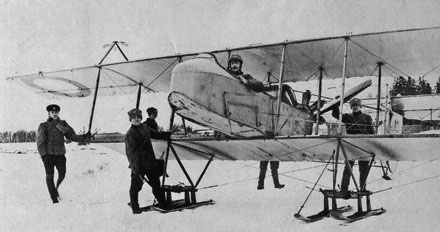
Tkachev developed a system of coordination between aviation and ground troops with the help of visual cues, in those days there was no radio on the aircraft. In particular, the technique has been introduced signaling pilots from the ground with geometric shapes, laid with white cloths, easily visible from a great height. For example, the letter "T" laid out near the headquarters of the regiment or division, meant that the commander of the unit requires the pilot to land for the immediate transfer of an important message. Form figures periodically changed to prevent the possibility of using the red false signals to introduce pilots to mislead or lure them into a trap.
Aviators in turn passed on the reports and orders on the ground with the help of discharged pennants or various combinations of colored flares. And when the fleet in Simferopol local craftsmen installed on two planes radio, efficiency and effectiveness of air intelligence has increased even more. It should be noted that such a clear and well-functioning system of relationships "between heaven and earth," as that organized Tkachev, there was no other white armies, nor red.
However, in the Civil, as in the First World, merit Vyacheslav Matveye not limited to only a manifestation of personal courage and piloting skills. Riding his theoretical and practical activity as a major aviation commander was the defeat in North Tavrii summer of 1920 cavalry group Dmitry Goons, numbering nearly 3,000 cavalry. Large cavalry forces of Wrangel, who had thrown all his horsemen to Donbass, was not there. And if it were not planes Tkachev ... So there is every reason to believe that it was in those days with the filing Tkachev born Russian attack aircraft and were first tested methods of interaction with aviation units broneotryadami. It is not surprising that for the fights June 22, 1920 Vyacheslav Matveyevich was awarded two Orders from: St. Nicholas 2nd degree, which he received one of the first in the White Army and the Military Order of the British Empire.
By late June, the intensity of the fighting has increased even more. Red cavalry under the command of the corps commander Goons broke through the front and rushed Perekop, threatening to cut off the Crimea Whites who fought in Northern Tavria.Rednecks have been more than ten thousand cavalry, supported by artillery and armored vehicles. It seemed that they could not stop, because the Whites in this sector of the front there were no reserves.

The plaque on the house where spent the last years of his life VM Tkachev
In this situation, Wrangell turned to aviation as his last hope. And the pilots did not disappoint. Early in the morning of 29 June 13 bombers "De Havilland", led by Tkachev, appeared over bedded red cavalry. At the first Bomb attack horses scattered. Driven mad by the noise, they dumped and trampled riders, overturned carts and artillery wagons. Freed from the bomb load, pilots watered enemy machine gun fire.
When the planes flew to rearm, red commanders somehow managed to gather the surviving soldiers marching in a column, but then followed by a new plaque, and behind him - another one. Here's how he described Tkachev in combat reports one of shturmovok:
"Under my leadership, the column was attacked near the village housing Goons Waldheim. After bombing the red panic rushed into the field. Pilots, down to 50 meters, machine-gun fire completely defeated the Reds, who had fled to the east and northeast. The whole field was covered with black spots of dead horses and men. Red were thrown almost all available their carts and machine-gun carts "
June 30 Goons body has ceased to exist as an organized fighting force. Small group of riders, hiding from airstrikes, scattered throughout the villages and hamlets, completely lost touch with the command. Not more than two thousand of them were able to escape and get to his. The rest either died or surrendered appeared in time to a place of breakthrough soldiers Wrangel's army.
The defeat of the cavalry Goons became the highest achievement of white aircraft in its history. Even the Soviet military science recognized this fact, and his example cadets flying schools studied the tactics of the Red Army aircraft against cavalry. In fact the first aviators had a decisive influence on the whole course of the war, because if goons managed to break through in virtually protected Crimea, red would have won already in July 1920.
But thanks to the Crimea pilots survived, and the war continued. In early August, red crossed the Dnieper near Kahovka and, without losing a moment, started to build on the captured bridgehead powerful lines of defense. When the white, pulling reserves tried to counter-attack, it was too late - Kahovka covered with a network of trenches and barbed wire, bristled artbatareyami and machine-gun nests. The counterattack failed, the Whites had to withdraw with heavy losses.
Wrangell again thrown in airplanes, but here for the first time tkachevtsev failed. Against the deep trenches, bunkers and artillery positions well protected machine guns and small bombs, which had armed white aircraft, were powerless. Air raids did not yield any results. Then the white pilots to bomb the crossing, which was on the supply Kakhovska groups, but in response to red began to deliver on the fight foothold, supplies and reinforcements at night.
Meanwhile, the number of White Guard Air Force gradually melted away, not so much because of the loss, but from accidents and breakdowns are extremely worn continuous combat operation of machines. If the beginning of September at Tkachev had about 30 airplanes, then after a month - less than 20 C to withstand such forces of the Red Army was unreal, and replenishment was not expected, as the Western Allies in the summer stopped deliveries.
The rest is known: 28 October red dealt a powerful blow to Kahovsky springboard towards Perekopa. Parry it was nothing.White had to hastily retreat in the Crimea. At the same time they destroyed on the frontline airfields almost all of its aircraft, which of disrepair could not get off the ground.
November 11 fell to strengthen the Turkish wall, and in the morning of the 15th the last steamer with the White Army soldiers and refugees set sail from the Sevastopol harbor.
The Civil War ended, and for Vyacheslav Tkachev began a long period of exile. He and his colleagues were evacuated first in Gallipoli, and then moved to Yugoslavia. There Tkachev, like many other immigrants, could not find jobs in their field. He has held several professions served as a consultant at the headquarters of the Yugoslav Army, he worked in private Danube River Shipping Company, until finally he found his new vocation in teaching, becoming head of the extracurricular education of Russian grammar school in Belgrade.
Tkachev from Turkey moved to Serbia, where he settled a lot of military units and government of the Russian army. Because it is not formally dissolved, service and career Vyacheslav Matveye continued: in 1922 he became a lieutenant-general, and in 1927 - the first and only Russian general of aviation.
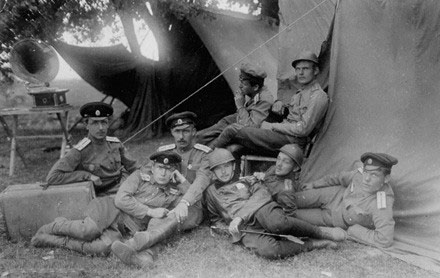
In 1933, VM Tkachev, together with engineer NE Kadesnikovym founded in Novi Sad Company "Russian Falcons" - military-patriotic youth organization. The Company was engaged in spiritual and physical upbringing of the younger generation has learned to remember and love to leave their homeland. In the same year, a book Tkachev "Memo Russian Falcon", addressed to the members of this organization.
All this time he has taken great pains to preserve the similarity Russian aviation units. But ... With the final collapse of the Russian army as a military and political organization Tkachev entered the service in the aviation inspection Kingdom of SHS (Serbs, Croats and Slovenes - the future of Yugoslavia). Saying goodbye to his students and military colleagues, says Vyacheslav Matveevich significant phrase: "Aviators around never will, but keep in mind that we should reach the aircraft a state which never will be at war with our homeland!".
Simultaneously with the general service is active in the Russian emigre organizations, showing great care by Device Russian pilots. Upon his retirement in 1934, he settled in Novi Sad, taught in Russian gymnasium. It also established a cell Sokolsky Russian society and became its first elder, and from 1938 to 1941, the second also edited the magazine "Russian sokolstva Way" - the publication of the "Union of Russian Falcons in Yugoslavia."
After Yugoslavia was occupied by the Nazis, with Tkachev, as with other Russian generals from around the world, began to work professionally intelligence agencies of the Third Reich, gently but firmly declining to military and political cooperation. For some time, General yielded to persuasion: I wrote a couple of appeals to Russian Cossack units formed body, a few months taught tactics Air Force to open in Belgrade Office of Himmler's top military-scientific courses where preparing officers for the military formations of the Russian emigrants and Soviet prisoners of war, expressed a desire to fight against the Soviet regime.

Filling with petrol airplane "Moran" O. On the right wheel should Vyacheslav Tkachev
But by the summer of 1942, Vyacheslav Matveevich not only breaks all contacts with the Nazis, but also pointedly neglects all immigrant organizations cooperating with them. In his diary he writes at this time: "A lot of disappointments prishlost me survive in the camp of the enemies of Soviet Russia. I have not found what I expected. But the die was cast. Having imbibed with the spirit of childhood discipline, I submit to the authority in the south of Russia and faithfully performed all to give me orders. Thus, no selfish considerations, not political opinion, but only a sense of patriotism prompted me in 1917 on an anti-Soviet way. As a result, I am 24 years old, yearning for the homeland, lived an immigrant. "
For two years he lived in almost complete oblivion. When in October 1944 to Belgrade Soviet troops approached, friends offered Vyacheslav Matveev evacuate. Tkachev flatly refused, obviously, deciding for themselves: let the best shot in the homeland, the farther to vegetate in a foreign land ...
He was arrested Oct. 20 employees Smersh 3rd Ukrainian Front. The General was sent to Moscow, where August 4, 1945 by the verdict of the military court sentenced to 10 years for "fighting against the Soviets during the Civil War." His wife was deported to the USSR did not, and a few years after the war, she was near Paris, in a nursing home.
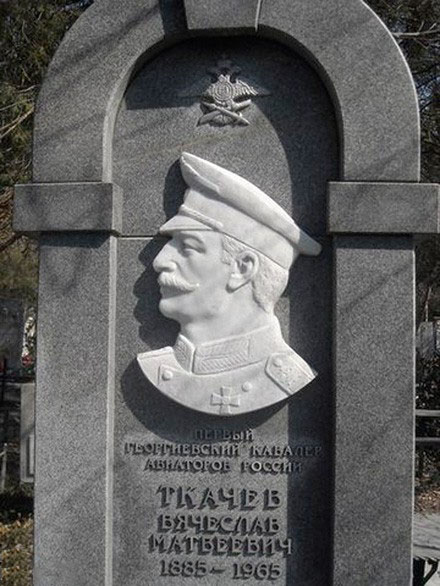
General Tkachev served his term "from start to finish" and was released in 1955. He was denied the right to live in the big cities. After a 35-year-old wandering, he returned to his native Kuban Krasnodar and settled in, sitting in the co-operative work bookbinder disabled with a salary of 27 rubles 60 kopecks per month.
Moonlighting that wrote notes on the history of aviation in the local newspapers. Then he wrote the book "Russian Falcon" - about his childhood friend and comrade in arms of Peter Nesterov. Printed book, and elated Tkachev sat down for a second - "Wings of Russia" (History of Russian military aviation 1914-1917.).
His wife, who moved to the time in Paris, wrote him a letter offering to emigrate again, promising to achieve through the Soviet Embassy permission to leave. However, Vyacheslav Matveevich replied
"I was given too hard homecoming, and I do not want to lose it again"
Last years of his life dedicated to perpetuating the memory of Tkachev military friends - the pilots of the First World War. He managed to write and publish a book "Russian Falcon" on PN Nesterov, but his life's work - the book "Wings of Russia: memories of past Russian military aviation 1910-1917 gg." And did not have time to see the light at the author's life .
V.M.Tkachev died March 25, 1965 and was buried in the cemetery of Slavic Krasnodar. In 1994, at the house where the way of life ended with the famous aviator, was a memorial plaque. At its opening arrived Commander Aviation Russian General PS Deinekin, and during the ceremony in the sky over the city in a clear parade of pilots swept aerobatic team "Russian Knights".
Vyacheslav Matveevich Tkachev was buried in the cemetery of Slavic Krasnodar. For many years, the place of his burial, as the name itself, was in oblivion. Only the 110th anniversary of the first Russian general aviation on the house number 82 on the street Shaumyana, where he lived the last years, the memorial plaque was unveiled: a rumble in the sky speeding aircraft aerobatic team "Swifts" ceremony held the then Russian Air Force Commander Gen. Peter Deinekin.



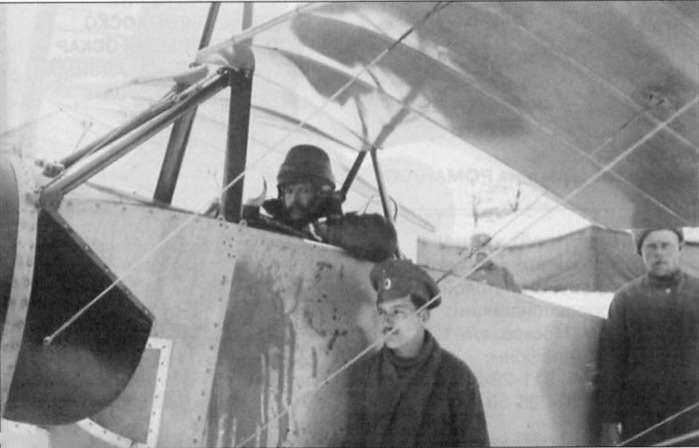


No comments:
Post a Comment